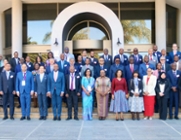2014 is both the Year of Developmental Local Government and the International Year of Small Island Developing States.
A majority of Commonwealth and CLGF members in particular are in small states, especially small island states. These countries have their own geographical, environmental and social challenges: are often vulnerable to natural disasters, climate change and frequently exhibit limited economic opportunities, weak governance structures and outward migration of skilled staff. In some cases where a country consists of a number of islands some of the remote ones are difficult to access and feel distant to central government with infrequent and difficult communications. In many such countries, particularly on remote islands, local governments are the only accessible form of government, and thus they are key partners in ensuring the resilience and vitality of these small states.
Small states are a priority for the Commonwealth and for CLGF. The recently produced Commonwealth Charter pays special attention to the needs of small states and recognises the importance of local government and democracy, including in small states, through its affirmation of the Aberdeen Principles for Local Democracy and Good Governance.CLGF is working in many small states. In the Pacific, it is seeking to strengthen local government through working at both national and local level. Working with country governments it is helping to to improve legislation and intergovernmental relations; working with individual councils and local government associations CLGF is helping capacity development for local leaders, especially women, running training programmes on leadership, strategic planning, financial management and service delivery, with a focus on local economic development (LED). CLGF also works at the policy level, increasingly on issues such as local government’s role in resilience, but also in enabling local government engagement in strategic regional dialogue with partners such as the Pacific Islands Forum and the CROP network. The CLGF biennial Pacific Local Government Forum, which will take place in Port Moresby, 19-21 May 2014, will highlight some of these issues. The forum will include examples of some of the good practice that is taking place, which highlights both the developmental nature of local government, and that small states can come up with resilient solutions if local government has this role.
The Caribbean also has a preponderance of small states, including many small island states. CLGF has worked in the Caribbean for the last 20 years, particularly to support the development of a regional forum of ministers with responsibility for local government – the Caribbean Forum of Local Government Ministers - and the Caribbean Association of Local Government Authorities both of which are helping to facilitate regional exchange and to highlight the role of local government can play in development, and in particular local economic development to meet the challenges of small states. CLGF is a partner with the Federation of Canadian Municipalities in this regional programme. CARILED has developed a number of pilot projects, which demonstrate how policy and legislation can be improved to help local government can play a more active and effective role in LED in small states. CLGF is also engaging with other partners such as UNDP, CARICOM and OECS to further develop its support for local government in the Caribbean, including many small states.
CLGF has provided technical advice and support to many small states in other regions seeking to strengthen local democracy, for example in the Maldives and Seychelles, and landlocked small states such as Lesotho and Swaziland where a number of pilot activities are being set up to improve capacity building, strategy development and community engagement. Many of our local government colleagues from small states have been able to interact with their counterparts from the Commonwealth network when we have held our own events in small states: Cyprus, Malta and Mauritius have all hosted regional events or Board meetings and one of our most successful Commonwealth Local Government conferences was held in the Bahamas in 2009, enabling others to have a taste of the opportunities and challenges of such a country and local councillors from across the archipelago of islands to meet and share experience with their peers from across the Commonwealth.
In addition to working with individual small states, CLGF is also influencing Commonwealth and international policy on small states through events such as the recent Commonwealth Global Biennial Conference on Small States in St Lucia and the forthcoming Small Island Developing States (SIDS) Conference in Samoa where it continues to highlight the valuable role of local government in small states.
Local government has an increasingly important role in delivering democracy and essential services in small states of the Commonwealth, being a key stakeholder in building resilient and responsive communities. At international level, CLGF and its members are advocating strongly for the localisation of the new sustainable development goals (SDGs) in respect of the post-2015 Development Agenda - for recognition of the role of local government in the implementation, planning and monitoring of the SDGs and to ensure that the goals can be aligned at the local national and global level. This approach, which applies to all countries including small states, was endorsed by Commonwealth Heads of Government in Colombo, 2013. With widespread support from member governments and key partners such as UNDP, CLGF has been actively engaged with the UN to take this forward. Local government’s role in small states will be significantly strengthened if these efforts to localise the SDG, are successful.





